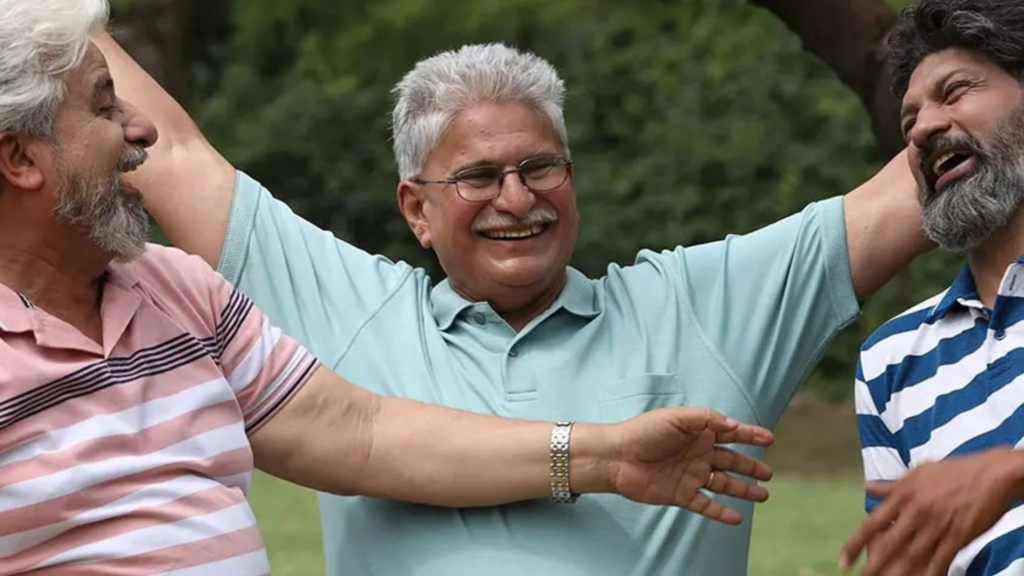
Imagine growing old surrounded by silence.
No laughter echoing in the room.
No one dropping by for a cup of tea.
No friendly voice asking, “How was your day?”
For many seniors, this isn’t just a moment—it’s their everyday life.
Loneliness is quietly becoming one of the biggest health risks for older adults, especially since the COVID-19 pandemic. Families are busy, friends may have moved or passed away, and health issues often make it hard to go out. As the world speeds up, many seniors are being left behind—emotionally and socially.
But here’s the heartening truth:
Socialization for seniors is more than just conversation or casual visits—it’s medicine for the mind, body, and soul. In fact, science shows that staying socially active can improve mood, sharpen memory, strengthen the immune system, and even help people live longer.
In this blog, we’ll walk through why socialization for seniors matters so much, how it deeply affects overall health, and share simple ways to bring connection back into everyday life. Whether you’re a caregiver, a family member, or a senior yourself—this guide is for you.
Let’s explore how small moments of connection can bring big changes to life.
The Science Behind Socialization and Longevity
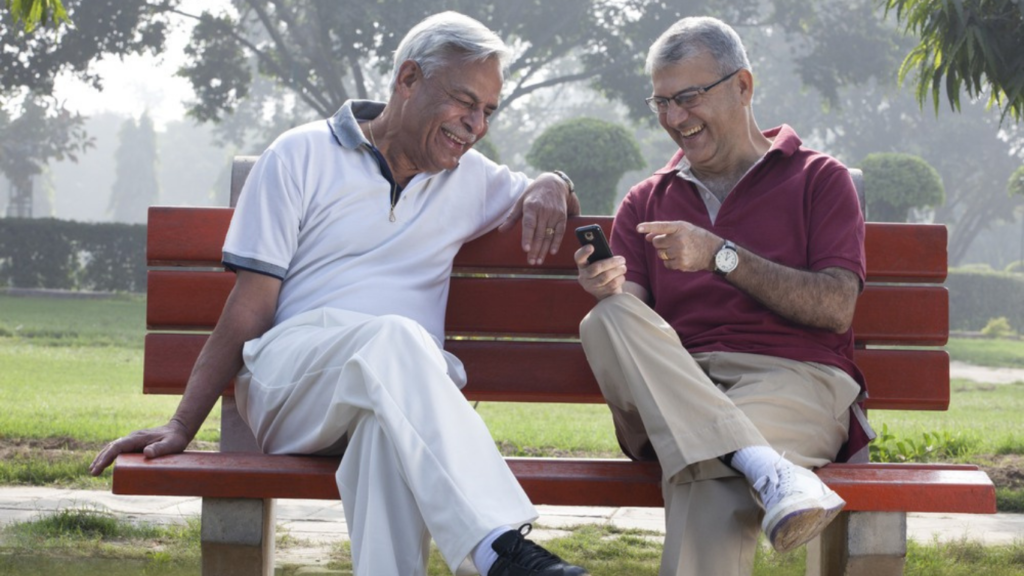
Let’s be real—most people think staying healthy in old age is just about medicines, exercise, or diet. But there’s something even more powerful, often overlooked: human connection. Yes, talking, laughing, being around people you care about—this can actually help you live longer.
What Research Says About Socialization for Seniors
Over the years, many researchers have looked into how relationships affect our health. And what they’ve found is both touching and eye-opening.
One of the longest studies ever done—the Harvard Study of Adult Development—followed people for over 80 years. You’d think money or fame would make people happy and healthy, right? But no. The strongest predictor of a long, happy life wasn’t wealth or even career success. It was a good, strong relationship.
The study proved that people who were more socially connected lived longer, had better memory, and stayed mentally sharp even in their 80s and 90s.
The Cleveland Clinic also supports this. They’ve shared that socialization for seniors can significantly reduce the risk of heart disease, depression, and even early death. Being socially active gives a sense of purpose—and that’s something our hearts and brains deeply need.
It’s not just a theory. It’s science. Being connected saves lives.
How Social Interaction Impacts the Brain and Body
Now you might be wondering:
“Okay, but how does just talking to people make me healthier?”
Here’s how it works—simple and real:
1. Boosts Brain Power
When seniors talk, play, or share stories, their brain stays active. Conversations trigger thinking, remembering, and learning—all of which keep the brain in shape. Regular socialization for seniors has been shown to slow memory loss and may delay the symptoms of Alzheimer’s and other forms of dementia.
2. Lowers Stress, Anxiety & Depression
Being alone too much can make anyone feel down. For seniors, that feeling of being “left out” or “forgotten” can lead to deep sadness, worry, or even depression. Social interaction acts like a natural antidepressant—it calms the mind and lifts the heart.
3. Strengthens the Immune System
Believe it or not, feeling connected to others can actually make your immune system stronger. Studies show that people with active social lives have fewer colds, lower inflammation, and bounce back faster from illness. Amazing, right?
4. Supports Heart Health
Stress and loneliness can silently hurt the heart. But laughter, love, and good conversations release hormones that help lower blood pressure, reduce harmful cholesterol, and support overall heart function.
5. Reduces the Risk of Dementia
A study published in The Lancet found that social isolation increases the risk of developing dementia by nearly 50%. That’s huge. But here’s the good news—just a few quality interactions a day can protect the brain for years.
Emotional Benefits of Staying Connected
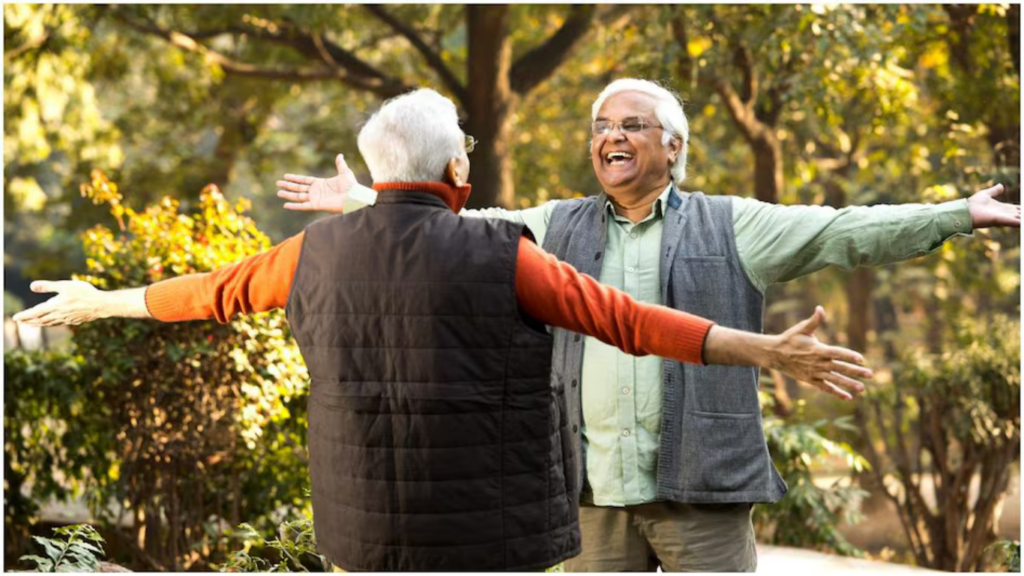
1. Fighting Loneliness and Isolation
Have you ever sat in a quiet room and felt like the silence was too loud?
That’s what many seniors go through every day.
Imagine being someone who once had a busy house, full of voices, love, and life. But now—days pass with barely a phone call or knock at the door. It hurts. And it doesn’t just hurt emotionally—it impacts the entire body.
One senior once shared this heartbreaking line:
“I don’t miss people talking to me. I miss people just knowing I exist.”
That’s the weight of loneliness.
Lonely seniors often feel forgotten, anxious, or even worthless. These feelings can quickly turn into chronic sadness or depression. On the other hand, those who stay socially active—whether by chatting with neighbors, joining a hobby group, or simply spending time with family—feel loved, included, and alive.
Socialization for seniors isn’t just about being around people. It’s about being seen, being heard, and most importantly, being valued. Regular interaction brings joy, laughter, emotional safety, and peace of mind—all of which are just as important as physical health.
2. Building a Sense of Purpose
We all want to feel like we matter, no matter how old we are.
Seniors are no different.
When older adults are invited to share their experiences, guide younger generations, or simply be part of something meaningful, their faces light up. Why? Because they feel needed. And that feeling—of being useful, of having purpose—can work wonders on emotional health.
There are many simple ways for seniors to rediscover purpose:
- Volunteering at local schools, hospitals, or charities
- Mentoring young people or caregivers
- Joining religious or spiritual groups
- Sharing stories or skills with grandchildren or neighbors
Even helping out in a community garden or attending a book club can create a new routine to look forward to.
Many seniors say,
“The best part of my day is when someone asks me for advice. It makes me feel like I still matter.”
And they absolutely do.
Socialization for seniors provides a powerful emotional shift—from feeling like a burden to feeling like a blessing. It helps them wake up with hope, with something to do, and someone to care about.
Common Barriers to Socialization for Seniors
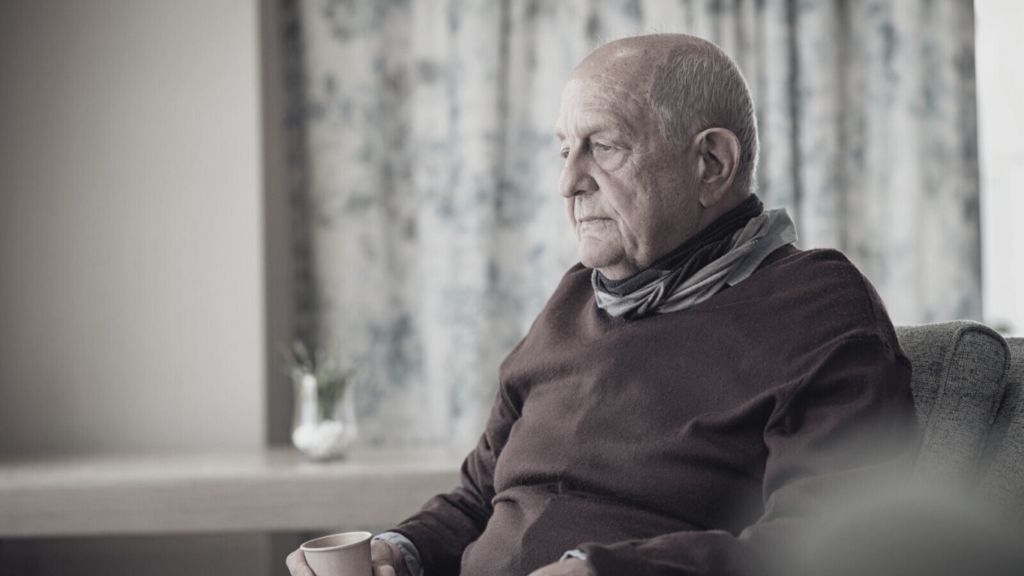
Not every senior who feels lonely wants to be alone.
Sometimes, even when the heart wants connection, life puts up walls that feel too high to climb.
Understanding these barriers with compassion is the first step toward helping our loved ones live fuller, more connected lives. Let’s gently look at the reasons why socialization for seniors can be difficult—so we can later talk about how to make it easier.
1. Physical Limitations or Health Conditions
Let’s face it—aging brings real physical challenges.
Walking becomes painful, eyesight weakens, hearing fades, and sometimes, even getting out of bed feels like a task.
Many seniors stay indoors not because they want to, but because their body doesn’t cooperate. Maybe they’re recovering from surgery, managing chronic illness, or afraid of falling while stepping out.
When pain becomes a daily visitor, socialization for seniors slowly disappears. And without support, it’s easy for them to withdraw completely—even when they’re craving company.
But behind that closed door is often someone waiting for a little chat, a visit, or even just a smile.
2. Loss of Friends or Spouse
This one cuts deep.
Losing a life partner or close friends changes everything. For seniors, these relationships were often their main source of comfort and companionship for decades.
When someone they loved is suddenly not there, the world feels quieter, heavier—and lonelier. Birthdays, festivals, and daily routines that once felt warm now feel empty.
It’s not just grief—it’s the loss of shared laughter, support, and deep emotional connection.
After such losses, many seniors pull back socially, not because they don’t care anymore, but because they’re hurting. Socialization for seniors then becomes something they fear will bring more pain, not joy.
What they need most in this time is gentle, patient care—and slow steps back into connection.
3. Technology Gap
In today’s world, it often feels like everything is happening online—video calls, WhatsApp chats, social media, even birthday wishes.
But many seniors didn’t grow up with smartphones or laptops. And for some, the fear of “doing something wrong” keeps them from even trying.
When children or grandchildren say, “Just open the link,” or “It’s easy, just join the video call,” it might feel like another reminder that they’ve been left behind.
The technology gap is a silent wall—one that can cut seniors off from even the simplest joys of staying connected.
This is why socialization for seniors sometimes needs a bridge—someone to sit beside them, patiently teach them, and help them reconnect with their world digitally, one small click at a time.
4. Fear, Insecurity, or Anxiety
Many seniors worry they’re “too old,” “too slow,” or “not interesting enough” to be around others.
They may ask themselves:
What if no one talks to me?
What if I can’t hear properly?
What if I forget things while speaking?
These aren’t just small worries. They can build up into fear—fear of embarrassment, of being judged, or of simply not fitting in anymore.
So, even when there’s an event nearby or someone invites them out, they often say no—not because they don’t want to go, but because their heart is filled with self-doubt.
This emotional wall makes socialization for seniors more difficult than we often realize. What they need is reassurance, kindness, and someone to remind them that their presence still matters—so much.
Practical Ways to Boost Socialization in Seniors
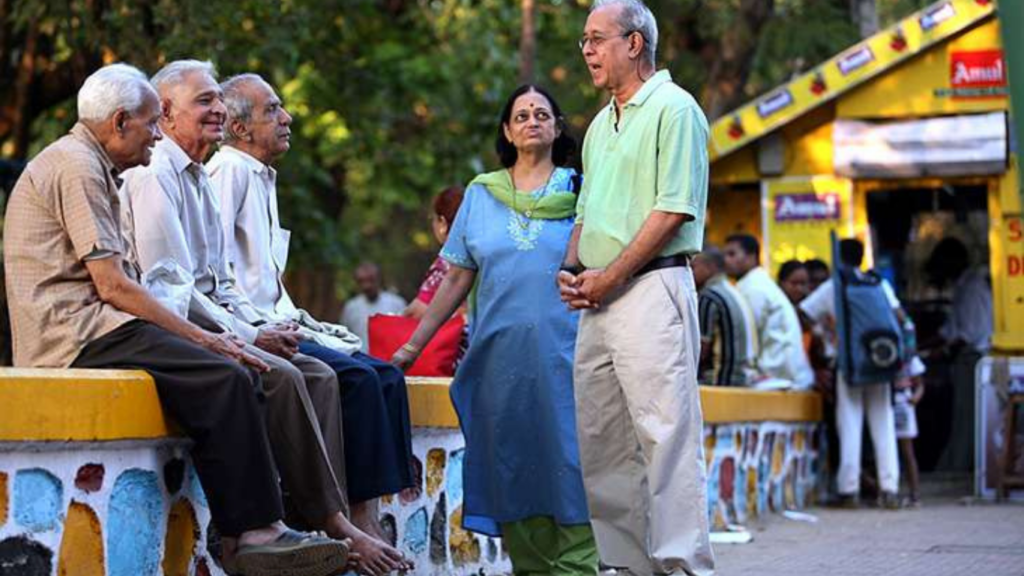
After understanding the emotional and physical importance of connection—and the struggles many seniors face—the next question is:
“So, what can we do about it?”
The good news? There are simple and beautiful ways to bring more social interaction into a senior’s daily life. You don’t need big plans or special events. Even the smallest effort can fill their heart with joy.
Let’s explore a few practical, heartfelt ways to strengthen socialization for seniors.
1. Daily Social Habits to Encourage
Social connection doesn’t always need grand gestures. Sometimes, the magic is in the little things:
- Morning walks with neighbors – Just stepping out in the fresh air and exchanging smiles or “good mornings” can uplift the mood. Regular walks build routine and open the door to friendly conversations.
- Phone or video calls with family – A 5-minute call can make a senior feel remembered and valued. Set reminders if needed. Even better, encourage weekly family video calls to keep the bond strong.
- Joining local senior clubs or hobby groups – Activities like knitting, singing, gardening, or yoga offer chances to meet like-minded people. These aren’t just pastimes—they’re lifelines.
Building these simple habits helps socialization for seniors become a joyful part of daily life—not a task, but something to look forward to.
2. Leveraging Technology to Stay Connected
Technology may seem scary to some seniors, but once they get comfortable, it becomes a powerful tool to fight isolation.
- Start with the basics: Teach them how to use WhatsApp for messaging and photos, Zoom for face-to-face video calls, and Facebook to see family updates and join senior communities.
- Use senior-friendly apps: Apps like Skype Lite, Be My Eyes, or Magnifying Glass + Flashlight are easy and useful. There are even platforms made just for older adults to make friends online.
The key here is patience. Sit beside them, show them slowly, and celebrate each small tech victory.
Remember: Socialization for seniors often needs a small helping hand to cross the digital bridge.
3. Family’s Role in Encouraging Engagement
Family isn’t just important—it’s everything. And when the family gets involved, seniors feel seen, heard, and deeply loved.
Here’s how families can play a bigger part:
- Celebrate small wins – Whether it’s walking 5 minutes extra, trying a new recipe, or learning a new app, cheering for these moments builds confidence.
- Involve them in everyday decisions – Ask their opinion while planning a trip, buying something for the house, or choosing a movie. It makes them feel included and respected.
- Create special moments –
🧒 Grandchild story-time
🍲 Family dinner nights
🎙️ Memory-sharing evenings where seniors talk about their younger days
These activities create meaningful connections and help socialization for seniors happen naturally, right at home.
4. Community & Professional Support
Sometimes, a little outside help can make all the difference—especially if family members live far away or are busy with work.
- Local senior centers & NGOs – Many communities offer events, workshops, and meetups just for seniors. Activities like music therapy, book clubs, or temple visits bring joy and interaction.
- Home visit programs – These programs send volunteers or professionals to check in, chat, and provide emotional support to seniors who can’t step out.
- Trusted caregiving services like VCare@Home – Our trained home caregivers don’t just look after health—they also offer companionship. A kind word, a smile, a shared cup of tea—this emotional care is just as important as medical care.
These services are especially valuable for seniors living alone or those recovering from illness. They ensure that socialization for seniors continues, even when mobility or energy is low.
Socialization Mistakes to Avoid
When we talk about socialization for seniors, our heart is in the right place — we want our elders to feel connected, valued, and not alone. But sometimes, even with the best intentions, we might take a few wrong steps. These small mistakes can unknowingly make things harder for them.
Let’s gently talk about what not to do, so we can support our loved ones in the best way possible.
1. Forcing Interaction Without Consent
Just because someone is older doesn’t mean they’ve lost their right to choose who they talk to, or how often. It’s easy to say, “You should go meet so-and-so,” or “Join this group, it’ll be good for you!” But let’s pause for a moment and ask: Are they ready? Are they comfortable?
Forcing social interaction — even with love — can feel overwhelming. Some seniors may still be grieving, some may feel shy, and others might simply need more time to open up.
🧡 Instead, try this: offer gentle encouragement. Invite them with love, not pressure. Let them know the door is open, and you’ll walk through it with them whenever they’re ready.
2. Ignoring Signs of Burnout or Depression
Sometimes, a senior might agree to attend social events or meet people — but it doesn’t mean they’re mentally or emotionally okay. If your loved one seems tired after every outing, or if their mood is low even after social interaction, it’s a sign they might be overwhelmed or silently struggling.
Loneliness and depression often hide behind a smile. This is why socialization for seniors must be balanced, sensitive, and never one-size-fits-all.
👂 Be a quiet listener. Watch for signs: fatigue, changes in sleep, sadness, or avoiding previously enjoyed activities. If you notice these, pause the social calendar and just be there — sometimes presence is more powerful than a party.
3. Overlooking Introverted Preferences
Not everyone thrives in crowds or loud conversations. Some seniors are simply more introverted — and that’s completely okay. While some may love tea parties and group games, others might prefer a one-on-one chat, a quiet walk, or just listening to their favorite music with someone beside them.
Here’s the golden rule: Quality over quantity. One heart-to-heart conversation can do more than ten surface-level hellos.
So, when planning socialization for seniors, ask yourself: “What makes them feel safe and happy?” A shared moment with a grandchild, a talk with a longtime friend, or a peaceful video call — these can be more meaningful than big events.
🌸 Respect their rhythm. Give them space to choose how they want to connect. Let them lead, and you follow with kindness.
Real-Life Story: How Socialization Changed Mrs. Sharma’s Life
Sometimes, the heart just needs a little company to start healing. Let me tell you a story—a story that might sound simple, but it holds the power to change lives.
The Silence After Goodbye
Mrs. Sharma was 72 when she lost her husband. They had spent over four decades together—laughing over morning chai, watching old movies, and arguing over which grandchild was the naughtiest. When he passed, everything changed.
Her once-busy home in Mohali suddenly felt empty. The walls echoed with silence. Her children lived in different cities, and though they called often, the loneliness was loud. She stopped going for walks. Meals became something she skipped more than she ate. Her health began to suffer—not just physically, but emotionally too.
She told her daughter one day, “I feel invisible.”
The First Step: A Gentle Nudge
Concerned, her daughter found a local senior activity group in Chandigarh. It was a small community that met twice a week for yoga, chai, and games. Mrs. Sharma resisted at first—she thought, “What will I do there? I’m too old to make new friends.”
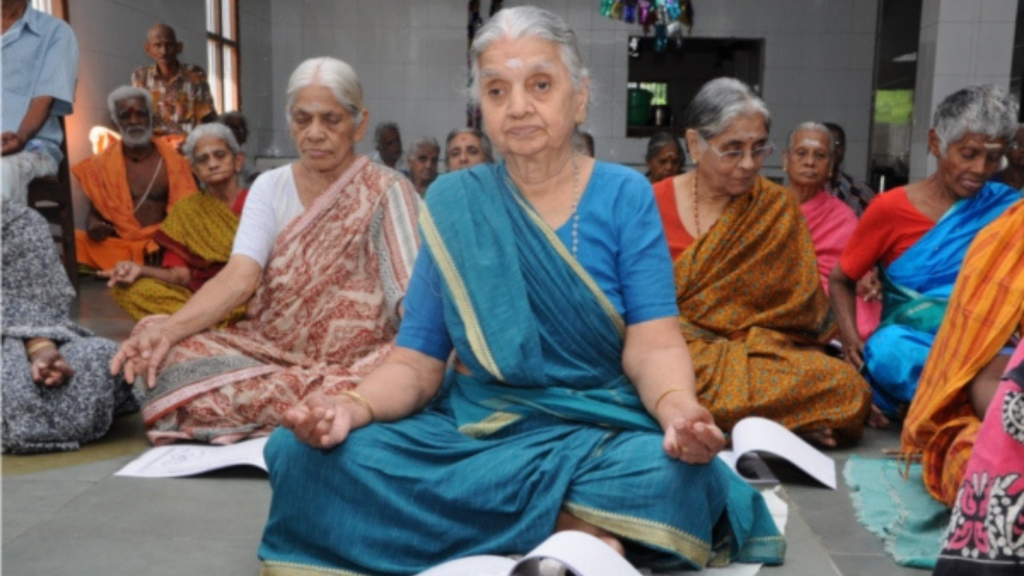
But eventually, she gave it a try. And that one visit changed everything.
A New Chapter Begins
The first day, she met Meera Aunty—another widow who had also been through a lonely patch. They connected instantly. They both loved knitting and old Hindi songs. Slowly, Mrs. Sharma started looking forward to those meetings.
The group wasn’t just about time-pass. They celebrated birthdays, shared meals, went on local trips, and even had storytelling nights. It became her second family.
And you know what? Her sleep improved. She started eating better. Her sugar levels became stable. The biggest change? That spark in her eyes came back.
The Power of Connection
This is what socialization for seniors can do. It’s not just about being around people. It’s about being seen, heard, and valued.
Mrs. Sharma’s story is a reminder that it’s never too late. One real connection, one small step outside the comfort zone—can turn loneliness into laughter.
She now says, “I lost my partner, but I found myself again.”
What We Can Learn
- Encourage your elders to take that first step, just like Mrs. Sharma did.
- Don’t underestimate the power of companionship. It’s medicine for the soul.
- Socialization for seniors isn’t a luxury—it’s a need, just like good food or clean air.
Today, Mrs. Sharma is one of the most active members of her group. And guess what? She even started teaching others how to use WhatsApp!
Conclusion: Loneliness Isn’t Inevitable—Connection Is Possible
Loneliness can feel heavy—like a quiet ache that never quite goes away. But it doesn’t have to be this way. The good news is, even small moments of connection can begin to lift that weight. Whether it’s a warm conversation, a shared meal, or a gentle walk with someone who listens, every interaction matters. Socialization for seniors is more than just keeping busy—it’s a lifeline to better health, a sharper mind, and a more joyful life. It reminds our elders that they are seen, heard, and valued.
If you’re caring for a loved one, or you are a senior yourself, please know this: it’s never too late to build connections. You don’t have to take giant steps. Even a little effort toward regular companionship can bring profound changes. Socialization for seniors isn’t a luxury—it’s a form of care, just as important as medicines or doctor visits. And if you feel overwhelmed or unsure where to start, you’re not alone.
At VCare@Home, we understand how powerful human connection can be. That’s why our caregivers are not just trained professionals—they’re kind companions who know how to bring light into someone’s daily life. If you’re looking for thoughtful, compassionate home care that values not just health but also heart, we’re here for you.
👉 Contact VCare@Home today and let’s bring meaningful, joyful socialization for seniors right to your doorstep.
FAQs: Socialization for Seniors
Q1. Why is socialization important for seniors?
A: It improves mental health, reduces loneliness, prevents cognitive decline, and may help extend lifespan.
Q2. How can family members help seniors stay socially active?
A: Regular visits, tech training, encouraging hobbies, involving them in family events, and arranging community participation.
Q3. Can social isolation really shorten a senior’s life?
A: Yes. Studies show social isolation is linked to increased risks of heart disease, stroke, and early death.
Q4. What are some senior-friendly ways to stay connected?
A: Community clubs, phone/video calls, volunteer work, religious gatherings, or local group activities.
Q5. What if a senior prefers being alone—should we still encourage interaction?
A: Respect preferences, but offer gentle options like one-on-one visits, pet therapy, or hobby-based connections.
Q6. How does VCare@Home support social engagement for seniors?
A: Our caregivers provide not just medical support but also emotional companionship, conversation, and meaningful engagement.


























